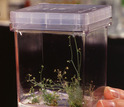Studies may lead to advances in human health, agricultural productivity, use of natural resources
 New research on plant and animal microbiomes will lead to advances in human health, agriculture. Credit and Larger Version |
January 24, 2017
Millions of microbes living on and in the human body collectively make up our microbiomes. These microbial ecosystems help keep us healthy. The same processes are at work in other animals, as well as in plants.
To better understand the role microbiomes play in human health and in ecosystems around the world, the National Science Foundation's (NSF) Directorate for Biological Sciences has awarded $3 million in Early Concept Grants for Exploratory Research (EAGER). In addition to microbiomes, the research will focus on plant and animal phenomics -- the study of the physical and biochemical traits of organisms as they change in response to genetic mutations and environmental influences.
The findings will foster improved human health and agricultural productivity and more efficient use of natural resources, such as land and water.
"These studies will lead to a better understanding of how microbial communities interact with one another and with their plant and animal hosts," says James Olds, NSF assistant director for Biological Sciences. "The results have the potential to improve human health through, for example, new insights into antibiotic resistance, and may contribute to discoveries of new bioactive compounds and the development of more efficient and sustainable food production."
The funding is a joint effort between NSF and the U.S. Department of Agriculture's National Institute of Food and Agriculture (NIFA). This is the first year the two agencies have partnered on research in the emerging areas of microbiomes and phenomics.
EAGER-funded projects will include research on:
- Technologies that increase the accuracy and speed of microbiome and phenotype data acquisition.
- Extending the diversity of phenotypes that can be measured.
- Automation and mechanization -- including the use of robotics and sensors -- for phenotyping, the process of predicting an organism's observable traits based on its DNA.
- Technologies to identify the metabolic activities of particular microbes within a microbiome, and to increase knowledge of biochemical communication between microbes, and between microbes and their hosts.
- New modeling approaches that address questions in microbiome or phenotype structure and function.
Identifying Small Molecule Inhibitors, Emily Balskus, Harvard University
High-throughput experimental methods to link mobile genetic elements with their bacterial hosts, Ilana Brito, Cornell University
Microfluidic Root Exudate Sampler with High Spatio-Temporal Sampling Resolution, Liang Dong, Iowa State University
Using novel, clone-free sequencing methods to discover host-microbe protein-protein interactions, Joseph Ecker, The Salk Institute for Biological Studies
Introducing Gulliver - an autonomous device to grow and study microorganisms in situ, Slava Epstein, Northeastern University
A Plant Observatory for remote sensing of biochemical reactions in vivo, Wolf Frommer, Carnegie Institution of Washington
Microwell array platform for high-throughput screening and discovery of microbial interactions, Ryan Hansen, Kansas State University
Single-locus multi-hormone reporters for comprehensive plant phenotyping: a synthetic-biology approach, Anna Stepanova, North Carolina State University
Chemical exploration of microbiomes at ecological spatial scales, Matt Traxler, University of California, Berkeley
Tools for Investigating Micron-Scale Spatial Organization of Microbial Communities, Jessica Mark Welch, Marine Biological Laboratory
-NSF-
Media Contacts Cheryl Dybas, NSF, (703) 292-7734, cdybas@nsf.gov
The National Science Foundation (NSF) is an independent federal agency that supports fundamental research and education across all fields of science and engineering. In fiscal year (FY) 2016, its budget is $7.5 billion. NSF funds reach all 50 states through grants to nearly 2,000 colleges, universities and other institutions. Each year, NSF receives more than 48,000 competitive proposals for funding and makes about 12,000 new funding awards. NSF also awards about $626 million in professional and service contracts yearly.
Useful NSF Web Sites:
NSF Home Page: https://www.nsf.gov
NSF News: https://www.nsf.gov/news/
For the News Media: https://www.nsf.gov/news/newsroom.jsp
Science and Engineering Statistics: https://www.nsf.gov/statistics/
Awards Searches: https://www.nsf.gov/awardsearch/

Results of the NSF EAGER grants will offer new insights into antibiotic resistance.
Credit and Larger Version

Antibiotic resistance is on the rise, leading to warnings from major health organizations.
Credit and Larger Version

The NSF-NIFA awards are contributing to the development of sustainable food production.
Credit and Larger Version

Scientists funded by the grants are improving the future of agricultural science.
Credit and Larger Version

The research may lead to discoveries of new bioactive compounds, such as those found in cranberries.
Credit and Larger Version
The National Science Foundation (NSF)
Guillermo Gonzalo Sánchez Achutegui
ayabaca@gmail.com
ayabaca@hotmail.com
ayabaca@yahoo.com
Inscríbete en el Foro del blog y participa : A Vuelo De Un Quinde - El Foro!

No hay comentarios:
Publicar un comentario